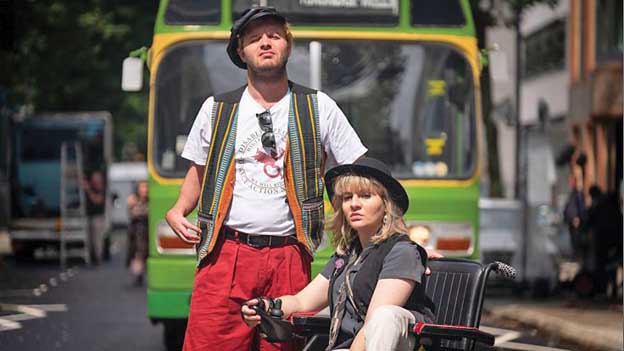Rights not charity – an account of disabled people’s direct action
Paul Couchman, Staines Socialist Party
Twenty-seven years ago, there were several days of protests in Westminster (outside Parliament), demanding equality and civil rights for disabled people. This was the culmination of several years of protests and civil disobedience by the disabled people’s Direct Action Network (DAN).
These were not just placard-waving protesters; these were proud disabled people and their allies, chaining themselves to buses, throwing themselves out of their wheelchairs, chanting ‘Piss on pity’ and ‘Rights not charity’.
In the early 1990s, I worked for a few years as a personal assistant (PA) to several of these disabled activists. I got to know some of the most inspiring people I have ever met.
Now, a TV programme has been made about two of these activists, Barbara Lisicki and Alan Holdsworth (aka Wanda Barbara and Johnny Crescendo – their cabaret stage names). I was privileged to work as their PA, with tasks as varied as looking after their little daughter and acting as national secretary to the DAN network.
One of the first targets was the ITV Telethon charity fundraiser. As Barbara says: “Telethon was a grim little charade of unacceptability. Sitting in baths of baked beans, dressing up like fools and showing films of pathetically tragic disabled children whose lives could only have meaning if the great British public donated their loose change. This was ITV’s vision of television with a noble purpose. They had no idea what was about to come their way…
Telethon
“In 1990 something within us snapped. [Disabled people] couldn’t stand the Telethon – it was a televisual monstrosity.”
At the 1992 ‘Block Telethon’ demo, protester Vic Finkelstein said: “Today, this protest is the only place in the whole of Britain that you can feel proud of being a disabled person”.
1992 was the last year of the Telethon. At the Block Telethon protests in 1990 and 1992, and on many of the subsequent protests in London, Leeds, Manchester, Birmingham, etc, many protesters were arrested. Anyone witnessing the events could not fail to be inspired by their determination and bravery.
This was an exciting and important time in the history of fighting for disabled people’s civil rights and the film brilliantly captures the mood of the time – including actual footage of some of the demonstrations for accessible public transport, and showcasing the range of talent among disabled actors, including Ruth Madeley and Arthur Hughes, who play the lead roles.
The film understandably concentrates on the relationship between Barbara and Alan, which is important, as intimate relationships between disabled people are rarely shown on mainstream TV. But the most important role of the film, in my opinion, was showing what can be achieved by a determined, militant group of activists fighting for a cause, and the eventual shortfalls in not linking this determination to the need to abolish capitalism and fight for a socialist society.
Trade unions
Some attempts were made to link up with the trade unions and broaden the political scope of the movement. There was an excellent demonstration by DAN in 1997 against the New Labour government in Downing Street, dubbed the ‘Blair’s Blood’ protest. The protest was against the ‘welfare reforms’, ie cuts, being proposed by the New Labour government.
Four wheelchair users climbed out of their chairs and smeared themselves and the pavement with red paint. Unfortunately, the film did not include this aspect of DAN’s work.
Barbara herself makes it clear at the end of the film that although much has been achieved (accessible public transport, the Disability Discrimination Act and subsequent Equality Act) disabled people are still treated as second and third class citizens. Disabled people are still over-represented among the unemployed, low-paid, and socially isolated in capitalist society.
Militant supporters (forerunners of the Socialist Party) at the time, including myself, produced a pamphlet called ‘Militant and Disabled’, aimed at providing a socialist alternative to the poverty and isolation faced by disabled people.
For disabled people to become fully included, equal members of society we need to address the root social causes of inequality and inaccessibility – capitalism and the profit motive:
Nationalising and fully funding the health and social care sectors – to provide universal health and social care without the profit motive
Investing in technologies and allowances to permit disabled people to participate more fully in society both in and out of work, with requirements for employers to supply them
Democratic working-class control of work and services, as part of a democratic, socialist plan for the economy – with representation of disabled people in running and planning services: nothing for us, without us
If readers want to see more actual footage of DAN protests, search ‘disabled people’s direct action network’ on YouTube.
- ‘Then Barbara Met Alan’ is available on BBC iPlayer








